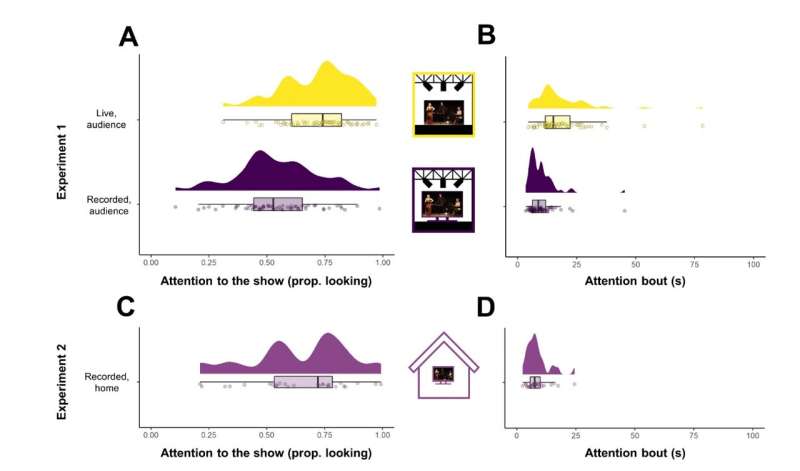This article has been reviewed according to Science X's editorial process and policies. Editors have highlighted the following attributes while ensuring the content's credibility:
fact-checked
trusted source
proofread
Baby opera: Study finds babies get a kick out of live music

When infants watch a live performance of a baby opera, their heart rates synchronized and they were significantly more engaged than babies who watched a recording of the same show—even though the recording was identical to the live version.
"Their heart rates were speeding up and slowing down in a similar fashion to other babies watching the show," says Laura Cirelli, assistant professor in the department of psychology at U of T Scarborough and co-author of a new study.
"Those babies were dealing with all these distractions in the concert hall, but still had these uninterrupted bursts of attention."
The findings suggest that even babies feel the impact of being at a live show, through both musicians' interactions with an audience and the social experience of being in a crowd. Cirelli recalls moments during the performance when a calm would sweep over the babies, and other times when a change in pitch or vocal riff would excite them all.
She says this may offer insights into why humans are hardwired to consume music and attend live shows in the first place.
"If there's something happening that we collectively are engaging with, we're also connecting with each other. It speaks to the shared experience," says Cirelli, director of the TEMPO Lab, which studies how infants and children respond to music.
"The implication is that this is not necessarily specific to this one performance. If there's these moments that capture us, then we are being captured together."
It's well established that socialization is crucial during early childhood development—an infant's brain is laying the groundwork for future life skills and abilities as it grows. Cirelli says music can play a powerful part in making those important bonds. She points to research finding infants are more likely to socialize with someone after hearing them sing a familiar song or dancing to music with them, and that infants have strong emotional reactions to music and song even before their first birthday.
"We consistently find that music can be a highly social and emotional context within which infants can foster connections to their caregivers, other family members and even new acquaintances," she says. "This audience study shows that even in a community context, infants are engaging with the music and connecting to their fellow audience members."
For the study, published in the journal Psychology of Aesthetics, Creativity and the Arts, researchers examined 120 babies ages six to 14 months as they watched a children's opera performed at a concert hall that doubles as a research facility at McMaster University (61 babies watched in person, the other 59 watched a recorded version).
The researchers meticulously broadcast the recording so the performers were at the same size, distance and volume as the live version. The babies' responses were tracked through heart monitors and tablets mounted on the backs of concert seats, and then afterward student research assistants combed through the footage to note when babies were looking at the stage versus when they looked away.
The live performance captured their attention for 72 percent of the 12-minute show while the recording held their attention for 54 percent. The live show also had them continually watching for longer bouts of time.
"Even little babies who may or may not have experienced music in a community context before are already engaging more when it's delivered this way," Cirelli says. "That's one question we have as music cognition researchers: What is it about the live experience that's worth it? Why would people go if there's not something fundamental about that live music experience that's above and beyond listening to music by yourself?"
That's not to say babies find virtual performances boring; after the onset of the pandemic, the researchers virtually studied one group of babies as they watched the same recording in their homes over Zoom. Those babies paid about as much attention as the ones who attended the live show—watching about 64 percent on average—but they were more likely to get distracted throughout and have shorter bursts of attention.
"The babies watching at home didn't have the distraction of being in a new place, they were in their comfort zone. But even without distractions the quality of their attention was still not nearly as strong as the audience in the live condition."
The study, which was co-authored by former TEMPO Lab postdoc Haley Kragness, now an assistant professor at Bucknell University, will also feed into some of Cirelli's other work. In a different study, she and a team of researchers are exploring whether a live performance over Zoom has the same impact on engagement as a live performance in person, and whether musicians' interactions with an audience can play a similarly powerful role in capturing attention.
Another study will investigate whether live performances impact their memory of the event and how watching a live performance versus a recorded version affects how they feel about the performer.
"If a baby is frequently brought to these kinds of events, will that shape their foundation for engaging in music and the community later in childhood?" Cirelli says. "It speaks to why we even engage with music at all."
More information: Haley E. Kragness et al, An itsy bitsy audience: Live performance facilitates infants' attention and heart rate synchronization., Psychology of Aesthetics, Creativity, and the Arts (2023). DOI: 10.1037/aca0000597




















